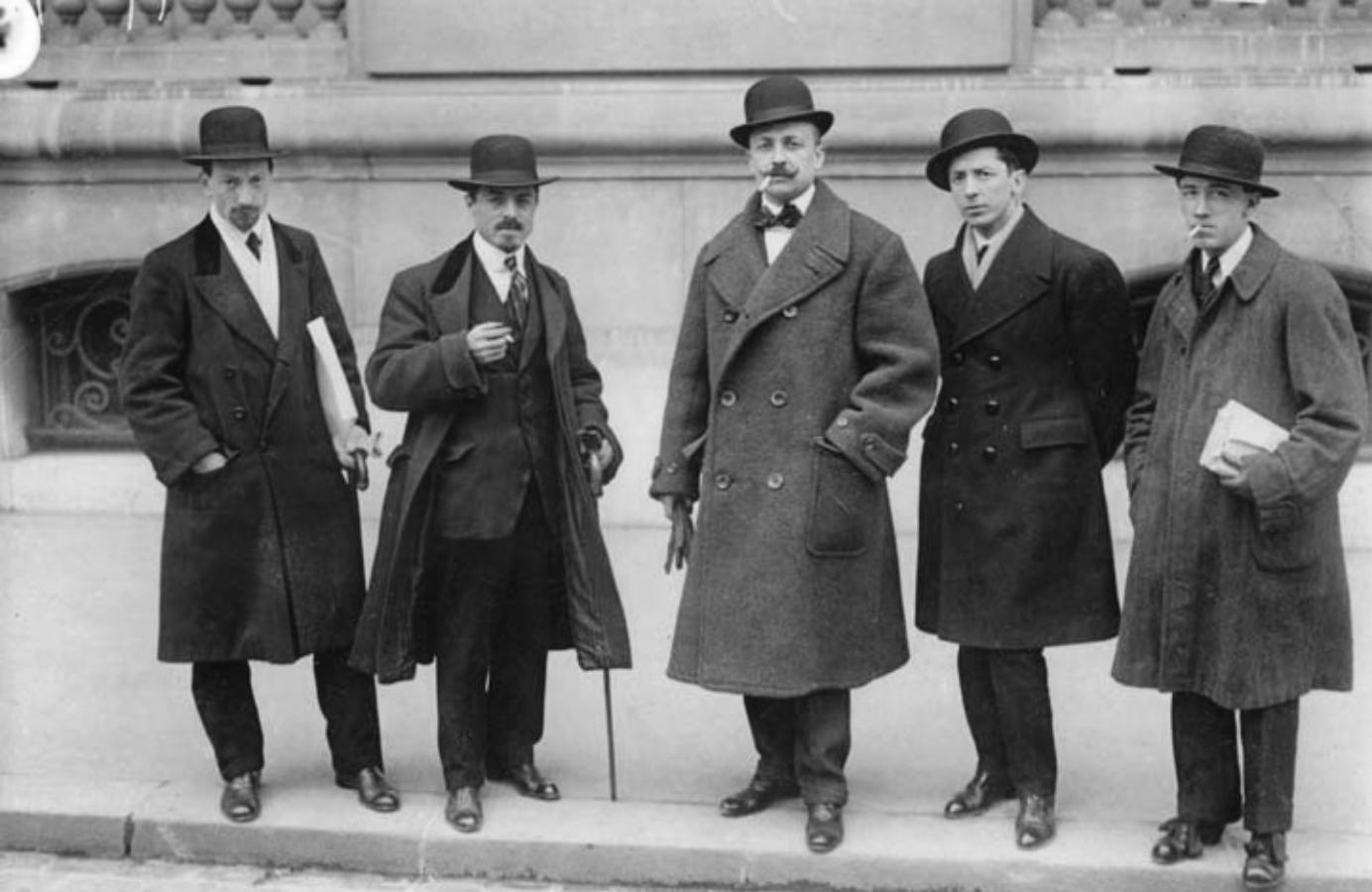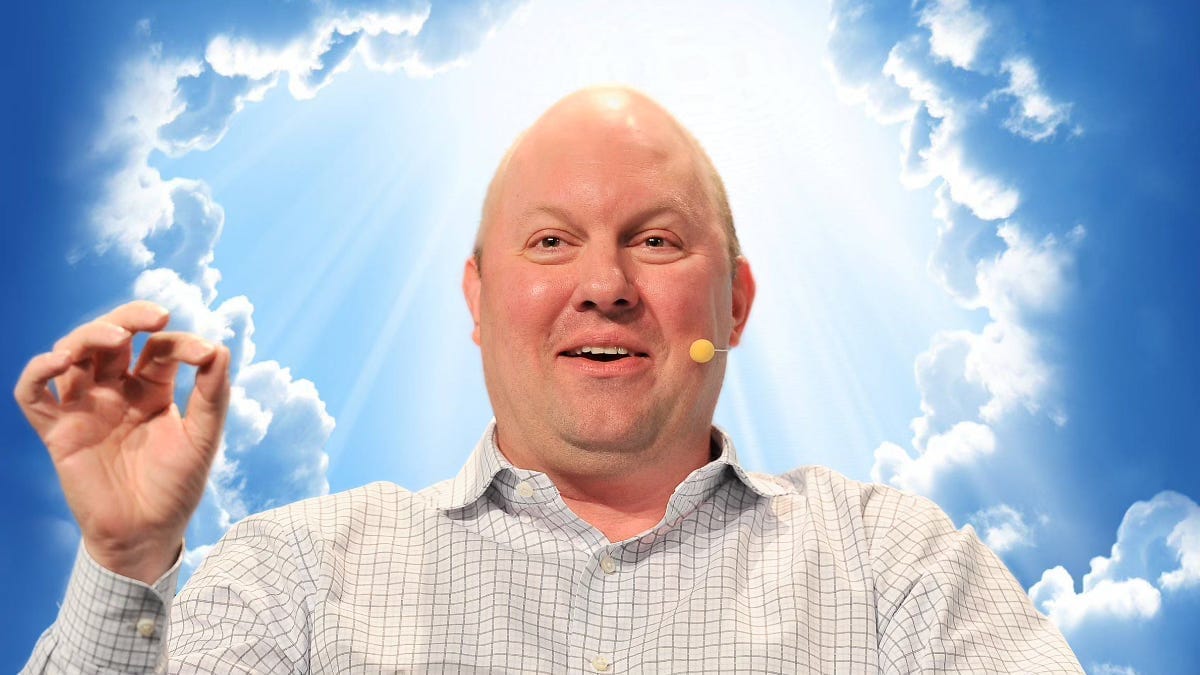Marc Andreessen wants you to believe you’re being lied to. “We are told to be angry, bitter, and resentful about technology,” he writes. But his Techno-Optimist Manifesto is going to wake people up. “Technology is the glory of human ambition and achievement, the spearhead of progress, and the realization of our potential.” If we trust the prophets of techno-optimism, Silicon Valley will deliver a future of wonders far beyond what we could ever imagine.
Fifteen years ago, this might have been a compelling pitch — indeed, a less megalomaniacal version was all the rage. Coming out of the Great Recession, the tech industry promised us convenience, prosperity, and empowerment. The smartphone revolution, the rise of the gig — I mean, sharing — economy, and all the other tech wonders like self-driving cars and advanced AI were going to irreversibly transform society for the benefit of all. But it didn’t play out as they claimed.
Inequality soared, life became more precarious, and bosses used tech to disempower workers, all while the kings of Silicon Valley became billionaires many times over and began to believe their riches were due to their inherent superiority, not the mix of privilege and dumb luck that really got them there. It should come as no surprise that the tide eventually turned on them and their companies.
Now they feel aggrieved and they’re back to make similar promises all over again, but this time instead of an open hand, they’ve extended a fist with the threat that if we don’t accept their future, there will be hell to pay. For Andreessen and his effective accelerationist (or e/acc) buddies, you have to choose: you’re either a techno-optimist who won’t question the faith, or you’re one of their enemies: the Communist boogeymen, the rising neo-Luddites, or the wider array of decels (decelerationists) arrayed to stop a supposedly better future from being realized. But the future they want to create is one we should all want to stop.
The world tech has built
In the Techno-Optimist Manifesto, Andreessen doubles down on Silicon Valley’s ideological view that a better future will be realized through technological advance guided by market forces rather than government intervention. Don’t look at the problems our companies have caused, he argues, train your eyes on the wonderful future we’re on the cusp of building. It’s the usual deception being revived once again to distract from present-day harms with promises of future prosperity, or eventual salvation.
“We believe the ultimate moral defense of markets is that they divert people who otherwise would raise armies and start religions into peacefully productive pursuits,” he writes under a section glorifying “free” markets. It’s a curious invocation. This is an argument often used to tout the benefits of the market system, but it’s hard to argue it reflects the reality of the tech industry — or even capitalism itself. You don’t have to read much history to see how the pursuit of land, labor, and resources has fueled colonialism, imperialism, and state violence for hundreds of years.
AI won’t save the world
By now most people should remember that Silicon Valley itself was borne of war, not peace. Its work has long been funded by the US government and particularly the Department of Defense to develop new technologies to aid the war effort and maintain American power across the globe. It’s only later that private companies rebrand that tech for the corporate and consumer markets. In Palo Alto, Malcolm Harris explained how the first generation of silicon transistors to emerge from the Valley went into Minuteman 1 missiles which were used to threaten the world with nuclear annihilation, and as I write this, the Israeli government is using AI to vastly increase its targets across the Gaza Strip, causing unimaginable death and destruction. That’s just the tip of the iceberg.
Despite their promise of economic miracles, the tech industry has not fueled a productivity explosion as their language would often suggest. They promised AI and robots would wipe out an unprecedented number of jobs through the 2010s, but that didn’t ultimately happen. Instead digital technologies were weaponized by bosses against workers at companies like Amazon and Uber before rolling out across the economy, while productivity grew at its lowest rate in decades. Don’t even get me started on the distraction caused by social media and our smartphones, filled with apps designed to capture our attention with constant minor dopamine hits.
But none of these facts really matter when you look at the deeper message of the manifesto. Andreessen is not making a pitch grounded in reality. He’s not laying out facts and figures to show you why you should trust him because the truth doesn’t matter. It’s more about vibes. He’s asking techno-optimists, e/acc adherents, and the wider public to place their faith in the barons of the tech industry to solve the problems that politicians and other powerful figures can’t seem to properly address, while making up false reasons that justify granting them further power.
The religion of technology
Silicon Valley has made faith-based appeals for years, if not decades. Efforts to realize transhumanism, the singularity, and the idea of the god-like AI we’ve been hearing about for the past year often feel more like religions than commercial pursuits. Steve Jobs was an expert at using faith as a marketing tactic, making the glowing Apple logo akin to a religious symbol and himself a tech deity by the time of his death. But Andreessen’s invocation of faith feels like more of a threat. He’s not trying to sell you a bunch of tech trash; he wants you to accept a worldview that justifies the power of tech billionaires.
If you read through the manifesto, you’ll quickly notice that Andreessen starts many of his sentences not with an expression of certitude, but one of faith: We believe, we believe, we believe, he writes over and over again, and expects his reader to believe it too. He believes growth is progress and lifts people out of poverty, despite the growing hardship being experienced across the world. He believes technological progress leads to material abundance for everyone, as the tech industry continues the process of erecting barriers to things that were previously free or shared. And he believes we should be “deliberately and systematically transforming ourselves” — a transhumanist nod to the revival of eugenics among the Silicon Valley elite.
Why Silicon Valley is bringing eugenics back
The connection between tech and religion is nothing new. “Modern technology and modern faith are neither complements nor opposites, nor do they represent succeeding stages of human development,” wrote David Noble in his 1997 book The Religion of Technology. “They are merged, and always have been, the technological enterprise being, at the same time, an essentially religious endeavor.” This may feel like an affront to some people — technology and the empiricism associated with it are supposed to be the complete opposite of religion, they might say. But through the course of his book, Noble effectively outlines the deep links between the two, from the long connection between technology and millenarianism to the role various religious orders played in fostering rather than hindering technological pursuits.
In a longer passage, Noble skewers not just how the industry uses faith toward its own ends, but the many people around it who buy into and echo the narratives about wonderful futures to distract from real harms. Today, as there’s a growing movement demanding the drawbacks of tech be considered and addressed, it’s no wonder tech billionaires are pushing back even more forcefully.
The expectation of ultimate salvation through technology, whatever the immediate human and social costs, has become the unspoken orthodoxy, reinforced by a market-induced enthusiasm for novelty and sanctioned by a millenarian yearning for new beginnings. This popular faith, subliminally indulged and intensified by corporate, government, and media pitchmen, inspires an awed deference to the practitioners and their promises of deliverance while diverting attention from more urgent concerns. Thus, unrestrained technological development is allowed to proceed apace, without serious scrutiny or oversight — without reason. Pleas for some rationality, for reflection about pace and purpose, for sober assessment of costs and benefits — for evidence even of economic value, much less larger social gains — are dismissed as irrational. From within the faith, any and all criticism appears irrelevant, and irreverent.
I just want to remind you, Noble was writing this in 1997, yet it still feels like a current and deeply relevant commentary. As usual when reading about the history of tech criticism, it shows how the problems we face with the tech industry today are not new at all, but as the power and wealth of its corporate leaders has expanded in recent decades, the threat they pose has grown immensely. It’s precisely why we need to remember these warnings and learn from their insights.
Billionaires like Andreessen know that people are looking for meaning in their lives and after years of stagnation and growing inequality they want some path to a better future they can believe in. They also know they’re in the perfect position to take full advantage of those deep-seated insecurities — which, in many cases, the tech industry was worked vigorously to make even more acute while claiming to do the opposite. Real solutions to those problems would involve challenging the power of Andreessen and his fellow tech executives, and that’s the last thing they want to see.
Embrace of fascism
Andreessen’s techno-optimist screed isn’t the first to champion the necessity of an unhindered technology movement to bring about a better future. In the early twentieth century, the Italian Futurists did something very similar. To be sure, art played a greater role in their time than it does among the software engineers and moneymen of Silicon Valley who have little cultural taste, but they still have a lot in common. “Italian Futurists were obsessed with cars and airplanes; they emphasized youth over experience; they believed that the only way to live was by pushing forward and never looking back,” wrote Ruth Eveleth as they warned about where the tech industry was headed for Wired in 2019.
For the Futurists, history had to be pushed aside to make way for the future. They embraced the growing fascist movement in Italy as the route to moving obstacles out of their way. The Futurists were seen as a “a church of speed and violence,” wrote Eveleth, or we might say of moving fast and breaking things. Filippo Marinetti, founder of the Futurist movement, even celebrated the invasion of North Africa. While it’s often been said that our modern technologists are not so excited about war, their industry’s long collaboration with the US military suggests otherwise, especially as they more openly champion military uses for their technologies to help the United States counter what it perceives to be a growing threat to from China.

To make the connection even more clear, Andreessen doesn’t just include Marinetti on his list of “patron saints” of techno-optimism, he cites a passage from Marinetti’s Manifesto of Futurism as well. “Beauty exists only in struggle,” Marinetti wrote. “There is no masterpiece that has not an aggressive character. Technology must be a violent assault on the forces of the unknown, to force them to bow before man.” The tech industry was able to get us to accept its remaking of the world without force in the past; but if that’s what it takes today, they’re happy to embrace it.
Andreessen doesn’t stop there. He also directly pulls from the work of Nick Land, often considered the “father of accelerationism” whose anti-democratic and anti-egalitarian ideas were deeply influential to the neo-reactionary and Dark Enlightenment movements. Later, he cites Milton Friedman, Friedrich Hayek, and even Ayn Rand’s Atlas Shrugged character John Galt as further “patron saints” of his movement. After once wanting to be see as the vanguards of a more enlightened form of capitalism, tech billionaires are championing their connection to extreme right-wing and even fascist figures — showing just who they were this entire time.
Resistance is essential
The Techno-Optimist Manifesto is an extension of a wider effort by the Silicon Valley elite to convince the public that they deserve the power and wealth they gained during the industry’s boom. They’ve revived eugenics to argue they’re intellectually superior, but that isn’t enough. They know that their positions are in jeopardy if the public starts to question whether they can ever deliver on their promises, so they’re drawing a hard line: you’re either with us or you’re against us. And if you’re against us, that will have consequences.
There’s ample evidence that neither Andreessen, nor Musk, nor any of the rest of them will be able to realize the futures they promise. Those visions only exist to keep us distracted from the real harms caused by their companies. It was probably most visible to me when Mark Zuckerberg introduced the metaverse in 2021, following months of criticism after revelations by whistleblower Frances Haugen. Before the keynote kicked off, Zuckerberg appeared in a pre-recorded video that was ostensibly to address the criticism, but was really to dismiss critics as people who think there will never “be a good time to focus on the future” and praise the “builders” like himself as the “heroes in our society who push the world forward.”
It brings to mind Marinetti. “We stand on the last promontory of the centuries!” he wrote in 1919. “Why should we look back, when what we want is to break down the mysterious doors of the Impossible?” Tech billionaires are radicalizing because they won’t accept any challenge to their power. Andreessen wants to force people to pick a side, hoping decades of hype around Silicon Valley will convince people to stick with the founders. But what it really shows is why criticism of the industry is so important and why a renewed Luddite movement is absolutely necessary. We must challenge the industry’s power and succeed in discrediting its titans before it’s too late.





Member discussion